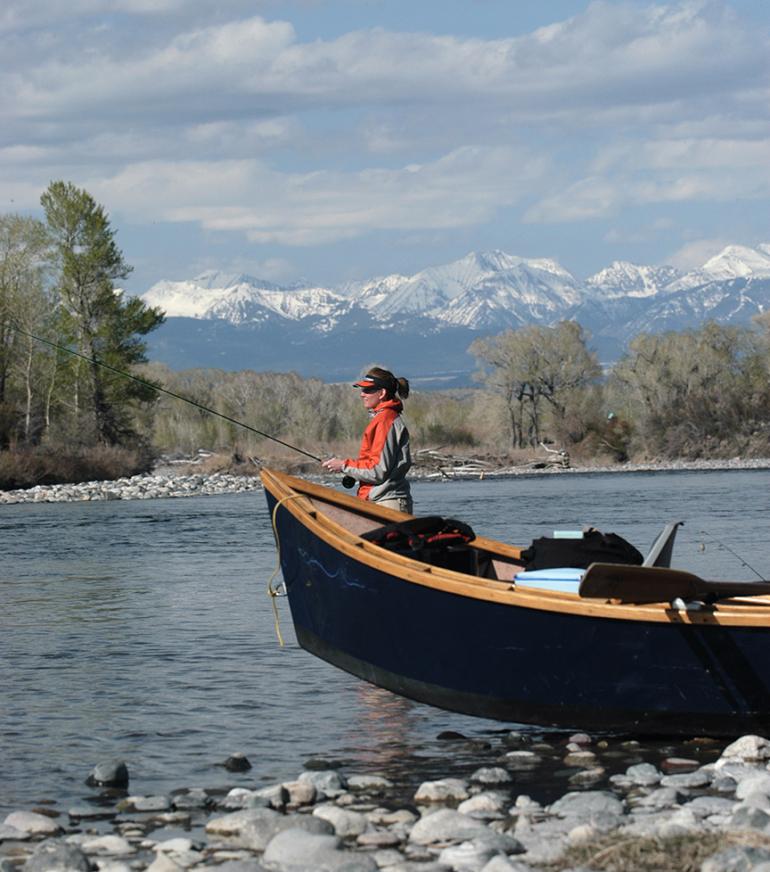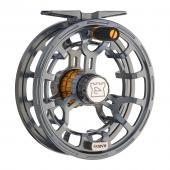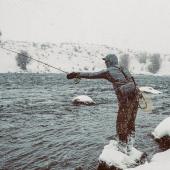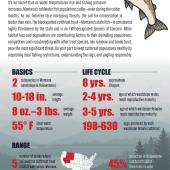Wading Through Tradition
It’s a brisk spring day and the sun has just risen over Paradise Valley when a green Volvo station wagon rolls into the empty parking lot at Armstrong’s Spring Creek. A herd of cows watch as Jennifer and Lars Olsson unload their waders, split-cane rods, fly boxes, and coffee thermoses from the car. It’s one of their favorite fishing spots and today there’s hardly any wind. Perfect. Jennifer and Lars hike upstream along the fenced-off banks and within minutes they’re wading in water up to their knees, doing what they enjoy most in life—casting their fly rods and eagerly waiting for a trout to join in the game.
Jennifer and Lars are both fortunate enough to have made their greatest passion a living, publishing books about fly fishing, importing and selling their own line of split-cane rods, and running a cutting-edge fly fishing operation in Sweden. But Jennifer, who in 1988 was one of the first females to receive an outfitter’s license in Montana, has often faced challenges due to her career choice. “When I grew up, fly fishing was a man’s world,” she says. “The sport had very few female role models and women were locked out visually; you didn’t see women in fly fishing ads or in articles about fishing.” Little did Jennifer know that she’d be breaking ground for female fly fishers later down the road.
Even though she was born and raised in a middle-class suburb near Los Angeles, Jennifer always felt attracted to the wilderness and the outdoors. But it was a tragic twist of fate that triggered her interest in fly fishing. When Jennifer was 13 years old, her mother died from breast cancer. As a result, Jennifer found herself adrift and anxiously clinging on to her dad, following him around like a shadow.
The summer after losing her mother, some friends of the family invited them on a fly fishing trip to Montana. For Jennifer, the trip was initially a disappointment. Every morning, Jennifer’s brother and the other boys would grab their fly fishing rods and follow their fathers to the river, whereas the girls were expected to stay with their mothers and the horses on the ranch. Jennifer soon tired of the horseback riding and felt abandoned. One day, she demanded to join the men fishing and got her way. “Soon I realized that fishing really appealed to me,” Jennifer remembers. “I’ve always been very social and had a lot of friends, but I was alone in experiencing the loss of my mom and fishing allowed me time to reflect upon all that had happened in a quiet way. I think that was incredibly healthy for me as a teenager.”
Jennifer’s interest in fly fishing grew into a passion and when she was in her late teens, she started working at Bud Lilly’s Trout Shop in West Yellowstone during the summers. Once again, she found that fishing was a man’s world. Jennifer was placed in the “girly” part of the store, selling art, clothes, and souvenirs, while the male sales associates were demonstrating tackle, suggesting fly patterns, and drawing maps to the hot fishing spots. “There was an invisible line running through the store and I wanted to get to the other side,” she says. “That’s where all the interesting discussions were!”
In the early 1980’s, Jennifer and her former husband opened their own tackle shop in Bozeman: the High Country Angler. Jennifer immediately noticed that she had a talent for instructing customers in casting techniques and started to think seriously about becoming a fly fishing guide. Said and done. She embarked on a three-year apprenticeship to get an outfitter’s license. With the license in hand, Jennifer quickly learned that the established fly shops didn’t quite know what to do with her. After introducing herself to every fly shop within 100 miles of Bozeman, she returned to wait by a phone that never rang. Still, Jennifer remained optimistic and little by little built her business up by word of mouth. Despite a slow start, it was the beginning of a busy career as the only active female fly fishing guide in the Yellowstone area.
Balancing her outdoor strengths and her more effeminate side, Jennifer always felt comfortable guiding both men and women; but it was the meetings with first-time female fly fishers that left her with the strongest impressions. Jennifer recalls that the men often initiated the fishing trips, eager to get their wives or girlfriends interested in the sport and sometimes leaving them feeling insecure and pressured to live up to the expectations. Witnessing the screaming and excitement of these women catching their first fish tops the list of Jennifer’s best guiding experiences. “To help somebody bring in their first fish is like delivering a baby. A lot of times I felt more like a midwife than a fly fishing guide,” Jennifer says. “When a woman gives birth, she usually remembers all the details and it’s the same thing with the first fish. Sometimes I talk to women that I guided several years ago and they still remember exactly how everything happened.”
Today, Jennifer and her husband Lars, who’s originally from Sweden, split their time between Bozeman during the winter and northern Sweden during the summer. Jennifer limits her guiding assignments to Scandiwest Flyfishing, Sweden’s first catch-and-release operation, started by Lars on the river Idsjöstrommen in 1989 and now run by the two of them. And 20 years after starting her guiding career, Jennifer says attitudes toward women guides have improved significantly. “It still happens that people who haven’t seen women guides at work are skeptical, but time has helped. Plus, since I began guiding, the general population, including women, has had more experience as fly fishers. Female guides coming behind me are better off than I was.” Jennifer also says that fly fishing women are more visible in advertising and the media today than they used to be and she’s hoping that this inclusion will encourage more women to try the sport. “The river is gender-independent,” she points out, “so why limit your advertising to just half of the population?”
Even today, most of Jennifer’s female clients come to her through their boyfriends or husbands and not on their own initiative. While Jennifer would like to see more women on the rivers, she cautions them from isolating themselves as a separate group or cause. Despite the prejudices that Jennifer encountered early in her career, she’s not willing to make it a feminist issue. “Quit making it a gender war,” she says. “It’s not such a big deal.” And ultimately, her advice is simple: “Just go fishing and enjoy yourself.”










